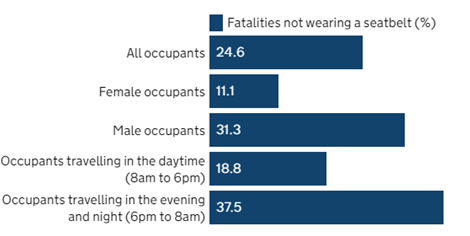The Department for Transport (DfT) has published final figures for reported road casualties in Great Britain, which show there were 1,624 fatalities in 2023, a decline of 5% compared to the previous year.
Some 29,711 people were killed or seriously injured (KSI), little change compared to 2022, while there were 132,977 casualties of all severities, a decline of 2% year-on-year.
Reported road fatalities in Great Britain, 1979 to 2023
Source: DfT
The DfT data also shows that 75% of fatalities and 61% of casualties of all severities were male.
Furthermore, 334 billion vehicle miles travelled in 2023, a return to travel levels seen in 2019 prior to the Covid-19 pandemic.
RAC road safety spokesperson, Rod Dennis, said: "Thankfully, this latest data shows overall casualty and fatality levels are down compared to 12 months earlier, and significantly down on a decade ago – despite a return to the number of miles being driven pre-pandemic.
“It also confirms that motorways are safer than any other type of road, especially compared to rural roads.”
However, he added: “Behind the headline figures there are some important points to note, such as the fact that men are far more likely to be killed or injured on our roads than women, and that pedestrian fatalities and those involving young people appear to be rising.
“Britain might have an enviable international reputation when it comes to road safety, but this latest data still shows there’s room for improvement.
“We hope the new Government’s forthcoming road safety strategy will help to reduce fatality and casualty numbers further.”
Of the four major road user types, the one with the biggest estimated percentage change for 2023 compared to 2022 for fatalities was motorcyclists, which showed a decline of 10%.
Meanwhile, in international comparisons for 2023, Great Britain ranked third out of 33 countries with available data for lowest number of road fatalities per million population.
James Broun, research manager at RoSPA, also welcomed the reduction in fatalities. However, he said: “We are particularly concerned that when we include the number of people seriously injured on the roads, the overall figure (29,711) has shown virtually no improvement over the last year.
“It's important to put this into context. Although it's good to see that road fatalities have decreased by 9% over the past decade, this is a marked slowdown compared to the 47% reduction achieved in the previous 10 years.
“Taking a longer view, it’s clear that without a comprehensive road safety strategy in place, momentum has been lost. We urge the Government to take decisive action and commit to a robust, evidence-based plan to prevent further unnecessary deaths and serious injuries on our roads.”
IAM RoadSmart director of policy and standards, Nicholas Lyes, added: “While it is welcome to see an overall reduction in fatalities on our roads over the last year, the fact remains that 1,624 people were still killed on the road network in 2023.
“These are preventable deaths and significant work is required to meaningfully tackle the number of road casualties across the country.
“Of particular concern is an increase in the proportion of fatalities where an occupant is not wearing a seatbelt which has risen from a fifth in 2022 to a quarter of those killed in a vehicle in 2023.
“Every death on our roads is a tragedy which causes untold grief for victims’ relatives. Progress on reducing road casualties has stagnated for over a decade so we urge the Government to accelerate its commitment to publish a new road safety strategy with a vision zero focus and measures to improve driving and riding standards.”
Brake calls for 20mph limit

To coincide with the release of the statistics, the road safety charity Brake has renewed its call on Government to put safety at the heart of all strategic decision-making related to transport, and to make a clear commitment to introducing measures that are known to save lives.
This includes the introduction of 20mph speed limits on urban roads, a new approach to the licensing system to safeguard young drivers, and a zero-tolerance approach to drink-driving.
The charity also calls on the Government to publish the promised Road Safety Strategy swiftly, with a firm commitment to stop crashes, reduce harm and provide sufficient funding to support families bereaved by road crashes.
Ross Moorlock, chief executive of Brake, said: “Road casualties are not just statistics. Behind every number is a family in turmoil. A grief-stricken family trying to navigate its way through the complex procedures that often follow a road crash. Behind every number is a family whose lives have been changed forever in an instant.
“That is why this year we have put road victims at the heart of our Road Safety Week campaign, as we reveal the stories behind the numbers and call for the very highest standard of care for every road victim.”
He continued: “The Government last published a Road Safety Framework in 2011. During the years there was a strategy in place (2011–2021), we began to see a small reduction in road casualties. However, since the latest framework expired (in 2021), more than 89,000 people have been killed or seriously injured on UK roads, and progress has stalled.
“We urge the Government to “move fast and fix things”, as the transport secretary set out in her first address to the Department for Transport, to prevent another 89,000 families having to go through the sudden trauma of a devastating road crash during this parliamentary term.
“We have already seen the positive change the introduction of a default 20mph limit in built-up areas is making in Wales, with a 32% reduction in all casualties on 20mph roads in the final three months of 2023, and a 23% reduction in deaths and serious injuries on 20mph roads in the first three months of 2024.
“We are also calling for the Government to commit to other solutions that are proven to stop crashes and save lives, such as progressive licensing for younger and new drivers, rolling out the General Safety Regulations that exist in the EU and Northern Ireland across all the UK, and reducing the drink-driving limit to almost zero.”
In 2023, the total societal and economic cost of road deaths and injuries was £42.2 billion. figure includes the cost to seriously injured people and to families navigating complex procedures and services.
Drivers not wearing seatbelts
Not wearing seatbelts is proving to be a factor in road casualties, made worse by the fact that such deaths are avoidable right from the start of the journey.
In 2023, around a quarter of all car occupants were not wearing seatbelts, but this proportion was higher for male car occupant fatalities and occupants travelling in the evening and night (6pm to 8am).

Source: DfT
Jack Cousens, head of roads policy at The AA, said: “Any fatality on our roads is one too many. While the headline figure shows a 5% fall in the total number of lives lost, there is much to be worried about when looking at the details.
“Shockingly, the number of drivers that lost their lives while not wearing a seatbelt has increased from a fifth in 2022 to a quarter in 2023.
“While ultimate responsibility lies with those sat in the driving seat, more two fifths (46%) of drivers feel they could get away with it due to a lack of police on our roads.
“The AA’s Motoring Manifesto made clear the actions we’d like the new government to take to help improve road safety.
“A meaningful road safety strategy is desperately clear, as well as more road traffic officers to help enforce the rules of the road.”
Top tips and best practice advice
Help is at hand for fleet managers needing advice on how to manage their drivers properly.
Improving drivers’ attitude and behaviour behind the wheel can be achieved in many ways, including, for example, by the use of data and training approaches.
All this and more, including the importance of root cause analysis and the company's legal responsibilities, plus how to engage drivers in the risk management process, will be discussed at next month’s Fleet & Mobility Live in a session entitled ‘Risk Management - human factors: a holistic safety policy’.
The free-to-attend Fleet & Mobility Live, sponsored by Octopus Electroverse for Business, takes place on October 8 and 9 at the NEC, Birmingham.
Register now to secure your free space at the most important fleet event of the year.

























Login to comment
Comments
No comments have been made yet.